Car Wash: Tips and Tricks for a Spotless Shine
Car washes are more than just a chore; they're a necessity for car owners looking to maintain their vehicles' appearance and longevity. From basic exterior cleans to comprehensive detailing services, the options are varied and abundant. But with convenience comes the responsibility of choosing the right service to ensure your car receives the care it deserves without risking damage. In this blog, we delve into the world of car washes, exploring their history, types, equipment, chemicals, business opportunities, safety tips, environmental impact, technological innovations, and DIY techniques. Whether you're a car enthusiast seeking the perfect shine or a business-minded individual looking to venture into the car wash industry, this blog has something for everyone. So, buckle up as we embark on a journey to discover the secrets of achieving that sparkling, showroom-worthy shine for your beloved vehicle.
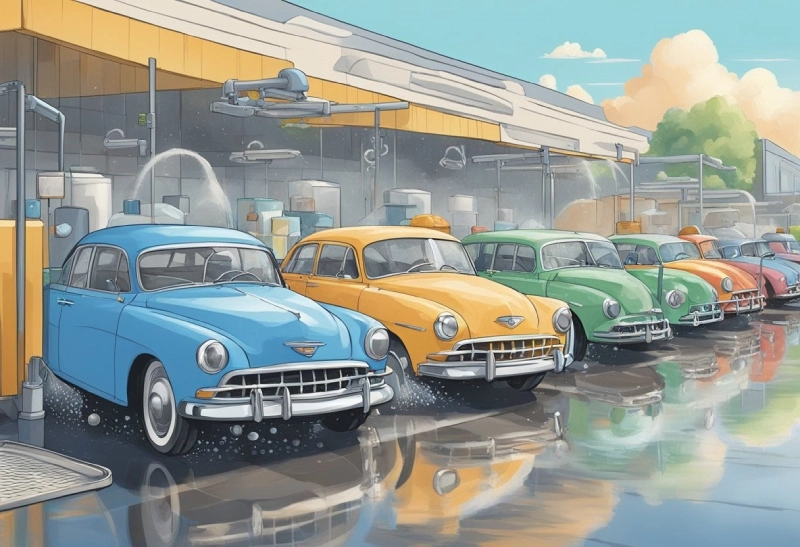
History of Car Washing
Keeping our cars clean has come a long way since the early days of automobiles. Let's take a trip through the sudsy history of car washing:
Early Days (1900s):
- The rise of the automobile called for new cleaning methods. The first patent for a mechanized car wash was filed in 1900, followed by the opening of the aptly named "Automobile Laundry" in Detroit in 1914.
- These early car washes were far from automatic. Cars were manually pushed through a series of stations where workers would wash, rinse, and dry them, in a process reminiscent of an assembly line.
Semi-Automatic Innovations (1940s):
- The 1940s saw the introduction of more automation. The first conveyor-driven car wash emerged in Hollywood, California in 1940. While it used a conveyor belt to pull cars through a tunnel, attendants were still needed for scrubbing and drying.
- In 1946, things got a bit more automated with the invention of the semi-automatic car wash system. This included a conveyor belt, an overhead sprinkler system for washing, and a powerful air blower for drying.
The Fully Automatic Wash (1950s):
- The 1950s marked a turning point with the arrival of the first truly automatic car wash. Invented by the Anderson brothers in Seattle, this wash eliminated the need for attendants in the tunnel, relying on a system of nozzles, brushes, and dryers to do the job.
Continuous Evolution (1960s-Onwards):
- Since the 1960s, car washes have continued to evolve, incorporating features like water recirculation systems, improved tire cleaning methods, and wraparound brushes for a more thorough clean.
- The 1970s saw the addition of automatic wheel cleaners, and the 1980s witnessed a renewed focus on car care as car culture boomed.
Today, car washes exist in many forms, from completely manual to fully automatic. The car wash industry continues to evolve with advancements in technology and changing customer preferences, offering a range of services from basic car washes to detailed car detailing and protective coatings. It’s a testament to the industry’s adaptability and commitment to meeting the needs of car owners.
So, the next time you pull into a car wash, take a moment to appreciate the history of innovation that went into making that sparkling clean car a reality.
For more information, please contact us at +91 9555695695 or send us an email at care@detailingdevils.com- premium car coating, Car Coating, Car detailing, Ceramic coating, bike detailing, Nano Ceramic Coating, Car Detailing Franchise opportunity.
Types of Car Wash Services
Car wash services can be broadly classified into five types: Self-Service, Hand Wash, Automatic, Steam Car Wash, and Waterless Car Wash. Each type has its own unique features and benefits.
- Automatic Car Wash This is the most popular type of car wash because it's quick and convenient. You simply drive your car into a stall, and the machine washes it for you. Automatic car washes typically use a series of brushes, soap, and water to clean your car. However, they may not be the best option for cars with delicate paint finishes or a lot of dirt and grime.
- Touchless Car Wash A touchless car wash uses high-pressure water jets and cleaning chemicals to clean your car without coming into contact with it. This is a good option for cars with delicate paint finishes or a lot of dirt and grime. However, touchless car washes may not be as effective at cleaning all the nooks and crannies of your car.
- Self-Service Car Wash A self-service car wash allows you to wash your car yourself. You pull into a bay, and there are hoses with soap, water, and wax that you can use to clean your car. Self-service car washes are typically the most affordable option, but they can also be the most time-consuming.
- Full-Service Car Wash A full-service car wash offers the most comprehensive cleaning experience. Attendants will wash your car by hand, both inside and out. They will also typically vacuum your car, clean your windows, and dress your tires. Full-service car washes are the most expensive option, but they are also the most convenient.
- Hand Wash A hand wash is the most thorough way to clean your car. You can do it yourself at home, or you can hire a professional detailer to do it for you. Hand washing your car allows you to get into all the nooks and crannies and ensure that your car is completely clean. However, it can also be the most time-consuming option.
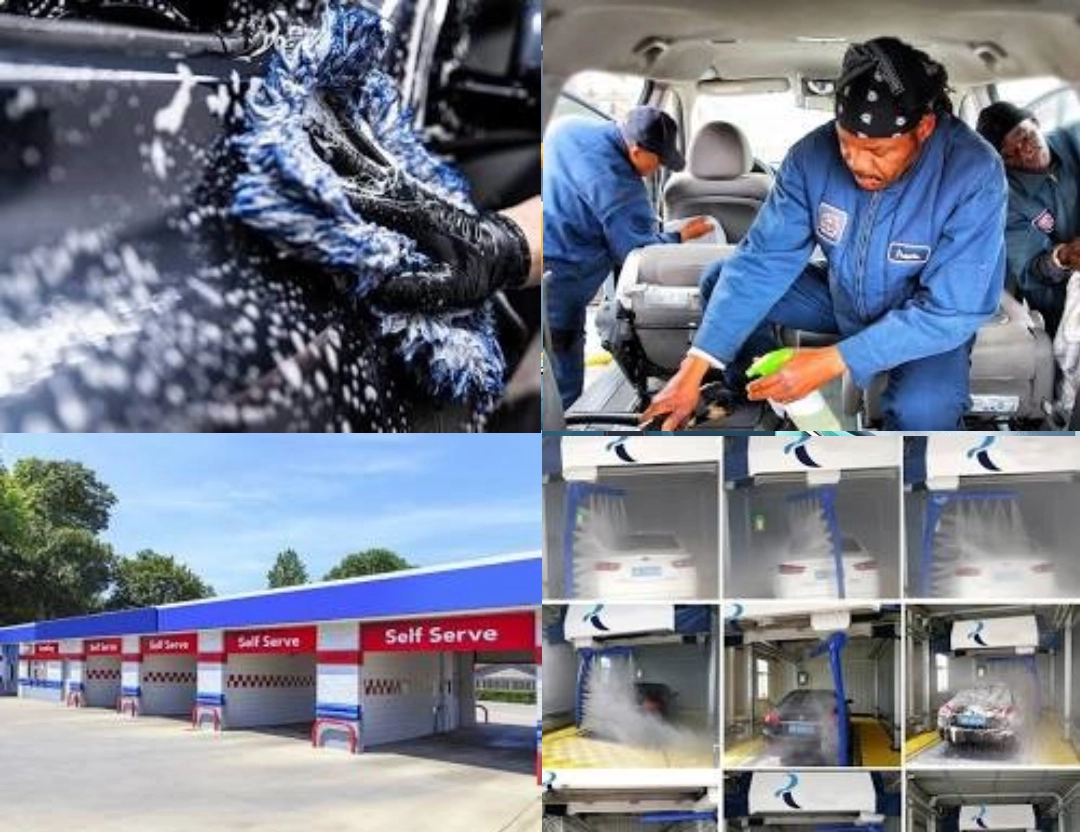
The best type of car wash for you will depend on your budget, your car's needs, and how much time you have.
Revitalize your ride with the epitome of care at Detailing Devils. Elevate your car or bike's shine with our premium car wash and bike wash services. Experience the ultimate in detailing expertise by visiting our franchise studio page. Simply navigate to https://www.detailingdevils.com/detailing-studios and select the location nearest to you. Your vehicle deserves the best, and we're here to deliver unparalleled results.
Car Wash Equipment
Whether you're running a high-tech automatic car wash or prefer the hands-on approach of a self-service bay, the right equipment is key to achieving a spotless car. Here's a look at some essential car wash equipment:
For All Washes:
- High-Pressure Washer: The workhorse of car cleaning, a pressure washer blasts away dirt, grime, and loose debris with a powerful jet of water. Choose between electric or gas-powered models, depending on your needs.
- Cleaning Solutions: Formulated car wash soaps create a thick lather that helps loosen dirt and grime without harming the paintwork. Opt for eco-friendly options whenever possible.
- Microfiber Cloths: These super-soft cloths are essential for drying and buffing the car without leaving scratches or streaks.
- Vacuum Cleaner: A powerful vacuum cleaner with various attachments tackles dirt, dust, and debris from the car's interior.
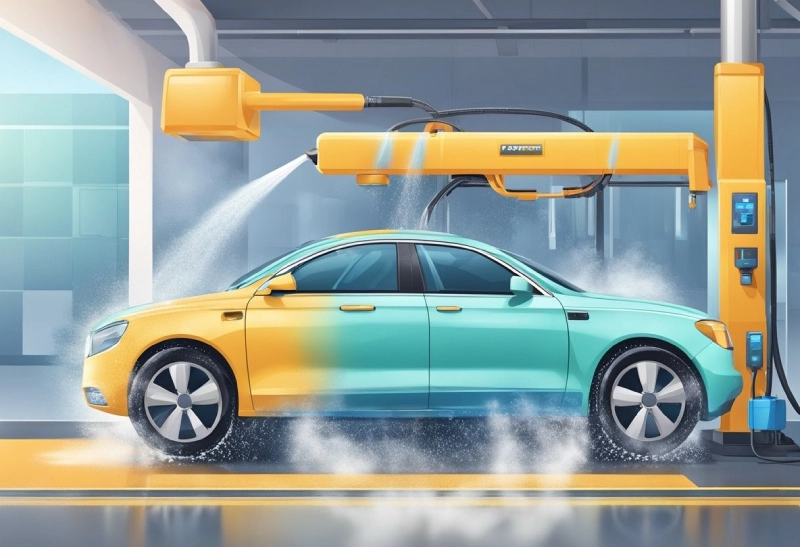
Automatic Car Wash Equipment:
- Conveyor Belt System: Guides cars through the wash tunnel at a controlled pace.
- Wash Arches: Equipped with high-pressure spray nozzles, these arches deliver a thorough rinse and soap application.
- Washing Brushes: Large, rotating brushes gently scrub the car's surface to remove stubborn dirt. Touchless washes may use softer cloth brushes instead.
- Undercarriage Wash System: Targets the underside of the car to remove road grime and salt buildup.
- Air Dryers: Powerful air jets blast water off the car's surface, leaving it virtually spotless.
Self-Service Car Wash Equipment:
- High-Pressure Wash Wands: These wands connect to a pressure washer and allow for targeted cleaning. They often come with different spray nozzles for varying cleaning tasks.
- Soap Dispensers: Deliver concentrated car wash soap for a sudsy clean.
- Foam Cannons: Attach to the pressure washer and create a thick layer of cleaning foam that clings to the car's surface for a deeper clean.
- Vacuum Stations: Equipped with powerful vacuums for cleaning the car's interior.
Additional Equipment:
- Wheel Washers: Specialized brushes or high-pressure attachments designed to clean wheels effectively.
- Tire Shine Applicator: Applies a protective coating to tires, leaving them looking shiny and black.
- Bug Sponges: Effectively remove stubborn bug splats from the car's front end.
- Interior Detailing Sprays and Brushes: For a truly comprehensive clean, various detailing products can tackle specific areas like windows, dashboards, and upholstery.
By having the right car wash equipment at your disposal, you can ensure your car receives the cleaning it deserves, keeping it looking shiny and protected for miles to come.
Car Wash Chemicals
Car wash chemicals are an essential part of any car wash business. They help to remove dirt, grime, and other contaminants from the car's surface, leaving it clean and shiny. There are several types of car wash chemicals available in the market. In this section, we will discuss the most commonly used car wash chemicals.
Soaps and Detergents
Soaps and detergents are the most basic car wash chemicals. They are designed to remove dirt and grime from the car's surface. Soaps are made from natural ingredients, while detergents are synthetic. Both types of chemicals work by breaking down the dirt and grime on the car's surface, making it easier to rinse away.
When choosing a soap or detergent, it is important to consider its pH level. A pH level of 7 is neutral, while anything below 7 is acidic and anything above 7 is alkaline. Most car wash soaps and detergents have a pH level between 7 and 10. It is important to choose a soap or detergent with a pH level that is safe for the car's paint and clear coat.
Waxes and Polishes
Waxes and polishes are used to protect and enhance the car's finish. Waxes provide a protective layer that helps to prevent dirt and grime from sticking to the car's surface. Polishes are used to remove minor scratches and swirl marks from the car's paint.
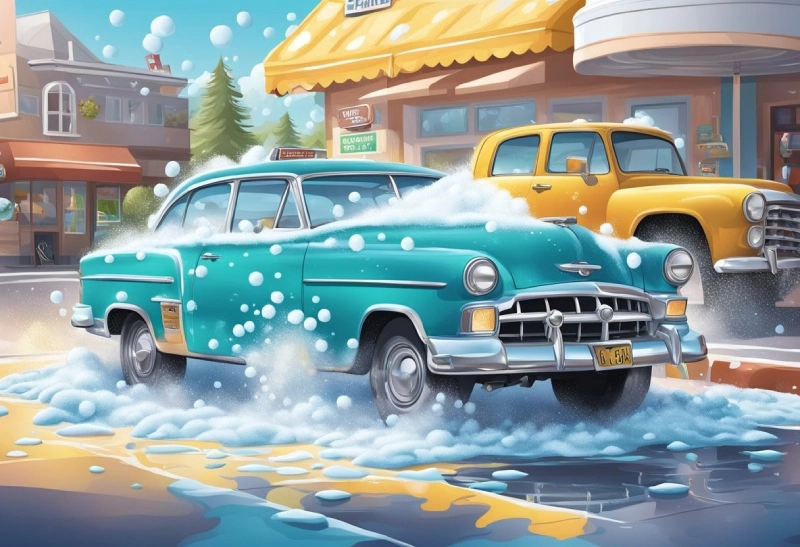
There are several types of waxes and polishes available in the market. Carnauba wax is a natural wax that provides a high level of protection and shine. Synthetic waxes are made from polymers and provide a longer-lasting protective layer. Polishes are available in different grades, with fine polishes being used to remove minor scratches and swirl marks, while coarse polishes are used for more severe damage.
Wheel and Tire Cleaners
Wheel and tire cleaners are designed to remove brake dust, dirt, and grime from the wheels and tires. They are available in both acid and alkaline-based formulas. Acid-based cleaners are more effective at removing brake dust and other contaminants, but they can be harsh on the wheels and tires. Alkaline-based cleaners are milder and are safer to use on all types of wheels and tires.
It is important to choose a wheel and tire cleaner that is safe for the type of wheels and tires on the car. Some cleaners are designed specifically for chrome wheels, while others are designed for painted or alloy wheels. It is also important to choose a cleaner that is safe for the environment and does not contain harmful chemicals.
Car wash chemicals are an essential part of any car wash business. By choosing the right chemicals, car wash owners can ensure that their customers' cars are clean, shiny, and protected.
From Sudsy Dreams to Sparkling Reality: Starting a Car Wash Business
The car wash business offers a steady stream of customers and the potential for a good return on investment. If you're looking to dive into the world of car cleaning, here's a roadmap to get you started:
Starting a Car Wash
Starting a car wash business requires careful planning and execution. The following are the key steps involved in starting a car wash business:
- Conduct market research to identify the demand for car wash services in the area.
- Choose a suitable location that is easily accessible and visible to potential customers.
- Determine the type of car wash service to offer (e.g., self-service, automatic, or full-service).
- Acquire the necessary equipment and supplies, such as pressure washers, hoses, soap, and wax.
- Hire and train staff to operate the equipment and provide customer service.
- Obtain the necessary permits and licenses from the local authorities.
Operations Management
Effective operations management is essential for the success of a car wash business. The following are some key factors to consider when managing a car wash business:
- Develop a standard operating procedure (SOP) to ensure consistency in service delivery.
- Monitor the performance of the equipment to ensure that they are functioning optimally.
- Train staff on safety procedures to prevent accidents and injuries.
- Implement a quality control system to ensure customer satisfaction.
- Maintain good hygiene and cleanliness to create a positive impression on customers.
Marketing Strategies
Marketing is critical to the success of any business, and a car wash business is no exception. The following are some effective marketing strategies for a car wash business:
- Develop a website to showcase the services offered and promote the business.
- Use social media platforms to reach out to potential customers and build a brand image.
- Offer discounts and promotions to attract new customers and retain existing ones.
- Partner with local businesses to cross-promote services and increase visibility.
- Use signage and flyers to advertise the business in the local area.
Regulatory Compliance
A car wash business must comply with various regulations and standards to operate legally. The following are some key regulatory requirements for a car wash business:
- Obtain a business license from the local authorities.
- Comply with environmental regulations related to wastewater discharge and chemical use.
- Follow safety regulations related to the handling of equipment and chemicals.
- Comply with labor laws related to minimum wage, working hours, and employee benefits.
- Obtain insurance coverage to protect against liability and property damage.
In conclusion, starting and managing a car wash business requires careful planning, execution, and compliance with regulations. By following the guidelines outlined in this section, entrepreneurs can establish a successful car wash business that generates a steady income.
Car Wash Safety Tips
Maintaining safety is a top priority for any car wash business. Proper training, equipment maintenance, and safety protocols can help prevent accidents and injuries. Here are some essential car wash safety tips to follow:
Vehicle Preparation
Before washing a vehicle, it's essential to ensure that the car is properly prepared to avoid damage or accidents. Here are some tips for vehicle preparation:
- Check for any loose or hanging parts that could get caught in the equipment.
- Remove any valuables or personal belongings from the car.
- Make sure all windows and doors are closed to prevent water damage to the interior.
- Check the brakes and ensure the car is in park or neutral before starting the wash.
- If the car has any special features, such as a sunroof or convertible top, make sure they are securely closed before starting the wash.
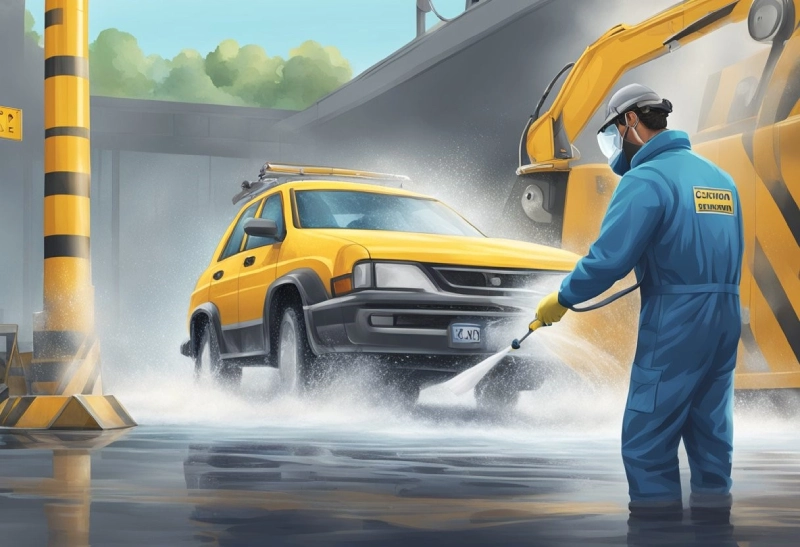
Chemical Handling
Car wash chemicals can be hazardous if not handled properly. Here are some tips for chemical handling:
- Always wear protective gear, such as gloves and goggles, when handling chemicals.
- Read and follow the instructions on the chemical labels carefully.
- Store chemicals properly in a secure location away from heat and flames.
- Never mix chemicals, as this can cause dangerous reactions.
- In case of accidental exposure to chemicals, rinse the affected area with water immediately and seek medical attention if necessary.
Equipment Use
Using car wash equipment improperly can lead to accidents and injuries. Here are some tips for equipment use:
- Always follow the manufacturer's instructions for operating the equipment.
- Keep the equipment clean and well-maintained to prevent malfunctions.
- Use caution when working near moving parts, such as brushes and conveyor belts.
- Never lean on or touch the equipment while it's in operation.
- In case of equipment malfunction, turn off the power and seek professional assistance.
By following these car wash safety tips, businesses can help ensure the safety of their employees and customers while providing quality car washing services.
Environmental Impact
Car washes can have a significant environmental impact due to the amount of water and chemicals used. It is important to consider the environmental impact of car washes and take steps to minimize it.
Water Usage
Car washes use a large amount of water. According to Fun environmental calculator, a typical home car wash can use up to 100 gallons of water, while a commercial car wash can use up to 500 gallons of water per car. This can put a strain on local water resources, especially in areas that are experiencing droughts.
Chemical Runoff
Car washes also produce chemical runoff that can be harmful to the environment. The chemicals used in car washes can include detergents, waxes, and solvents. When these chemicals are washed off the car, they can enter the stormwater system and eventually end up in rivers, lakes, and other bodies of water. This can harm aquatic life and lead to water pollution.
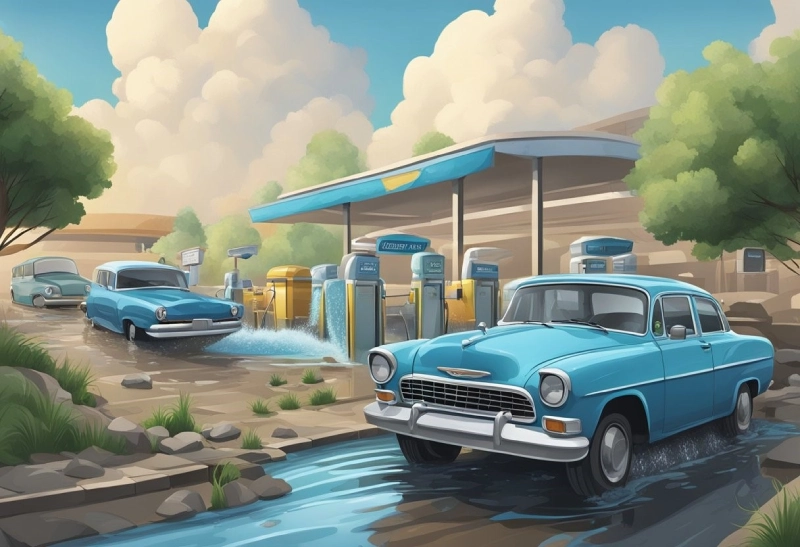
Recycling and Reclaim Systems
To minimize the environmental impact of car washes, some car washes use recycling and reclaim systems. These systems capture and reuse the water used in the car wash process. According to Treehugger, these systems can reduce water usage by up to 80%. In addition, some car washes use biodegradable and eco-friendly cleaning products to minimize the amount of chemical runoff produced.
Overall, it is important to consider the environmental impact of car washes and take steps to minimize it. By using recycling and reclaim systems and eco-friendly cleaning products, car washes can reduce their environmental impact and help protect the environment.
Innovations in Car Wash Technology
The world of car washes is no longer just about soap and sponges. Technology is revolutionizing the industry, offering a more efficient, eco-friendly, and convenient car cleaning experience. Here's a look at some of the most exciting innovations making waves in car washes:
Water Warriors: Conservation Takes Center Stage
- Water Recycling Systems: These systems capture, treat, and reuse washwater, significantly reducing water consumption. This is not only eco-friendly but also saves money on water bills.
- Touchless and Water-Saving Washes: High-pressure water jets and specialized cleaning solutions effectively remove dirt without the need for traditional brushes or excessive water usage.
- Foam Washing Technology: Thick foam clings to the car's surface, loosening dirt and grime for a thorough clean while minimizing water usage.
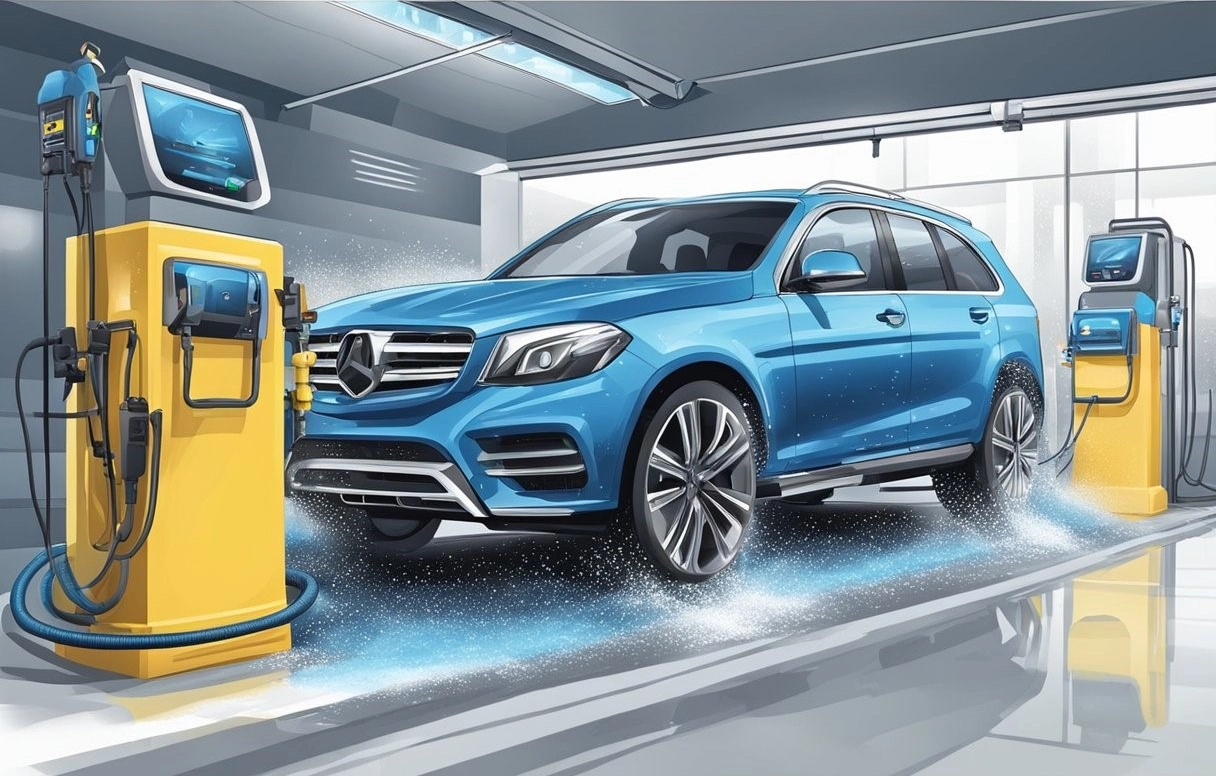
Shining a Light on Cleanliness
- UV-C Disinfection: Ultraviolet C light technology eliminates bacteria and viruses from car interiors, promoting hygiene and freshness. This innovation gained traction during the COVID-19 pandemic and is likely to stay.
Smart Suds: Automation and Convenience
- Automated Wash Systems: Advanced sensor technology and robotics are making car washes even more automated. Precise spray patterns and touchless cleaning ensure a consistent and gentle clean.
- RFID Tags for Personalization: Radio-frequency identification tags can store customer preferences and loyalty program information. This allows for personalized wash experiences and faster transactions.
- Mobile App Integration: Mobile apps allow customers to schedule washes, pay contactlessly, and even track their car's progress through the wash tunnel.
Looking to the Future: A Sustainable and Efficient Wash
- Waterless Car Wash Solutions: Eco-friendly cleaning solutions and specialized cloths can effectively clean cars without a drop of water. This is ideal for water-restricted regions or for those seeking a more sustainable option.
- Nanotechnology for Paint Protection: Nanotechnology-based car washes can apply protective coatings that repel dirt and water, making future washes easier and extending the life of your car's paint job.
These innovations are just the beginning. As technology continues to evolve, we can expect even more efficient, sustainable, and personalized car wash experiences in the future. So, the next time you pull into a car wash, take a moment to appreciate the cutting-edge technology that keeps your car looking shiny and new.
DIY Car Wash Tips
Keeping a car clean is important not only for its appearance but also for its longevity. While there are many professional car wash services available, doing it yourself can save money and provide a sense of accomplishment. Here are some tips for a successful DIY car wash.
Equipment Needed
Before starting the car wash, gather all the necessary equipment. This includes a bucket, car wash soap, microfiber towels, a hose, and a nozzle. It is also recommended to have a separate bucket and sponge or mitt for the wheels to prevent scratches on the car's body. A soft-bristled brush can also be used for cleaning wheels and tires.
Effective Techniques
To avoid damaging the car's paint, it is important to use proper techniques when washing. Start by rinsing the car with water to remove any loose dirt and debris. Then, using the soap and a clean sponge or mitt, wash the car from top to bottom, rinsing frequently. It is important to rinse the sponge or mitt frequently to avoid scratching the paint. After washing, rinse the car thoroughly with water and dry it with a microfiber towel to prevent water spots.
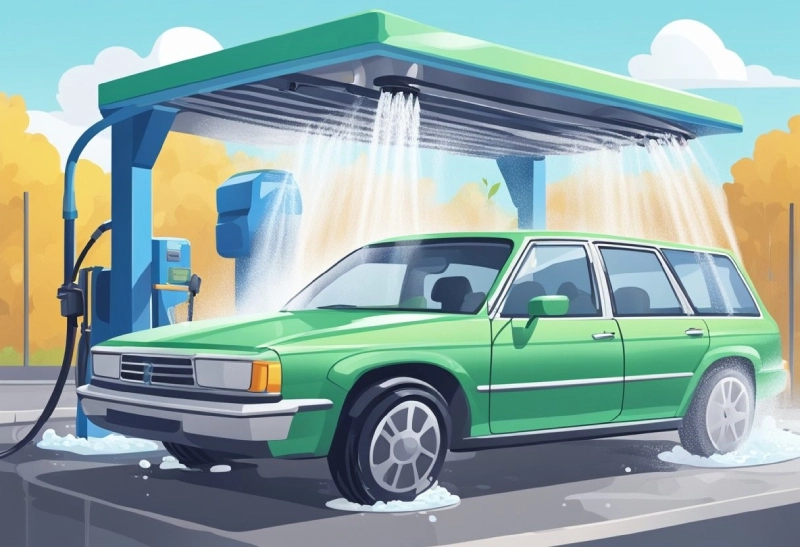
Common Mistakes
One common mistake when washing a car is using dish soap instead of car wash soap. Dish soap can strip the car's wax and damage the paint. Another mistake is using a dirty sponge or mitt, which can scratch the paint. It is also important to avoid washing the car in direct sunlight, as this can cause water spots. Finally, using a high-pressure nozzle on the hose can also damage the paint, so use a gentle stream instead.
By following these DIY car wash tips, anyone can achieve a clean and shiny car without spending a lot of money at a professional car wash.
Future of Car Washing
The car wash industry is undergoing a metamorphosis, driven by a focus on sustainability, convenience, and ultra-cleanliness. Here's a glimpse into what the future might hold for getting your car squeaky clean:
Sustainability in the Sudsy Lane:
- Water Won't Be Wasted: Water scarcity will be a driving force. Expect advancements in water recycling systems, with multi-stage filtration and near-zero discharge levels. Waterless wash solutions and super-efficient spray technology will further minimize water usage.
- Eco-Friendly Formulas Take Over: Biodegradable cleaning products formulated with plant-based ingredients will become the norm. Look for waste reduction efforts, with concentrated cleaning solutions and refillable dispensers becoming commonplace.
- Renewable Energy Powering the Wash: Solar panels and wind turbines could be integrated into car washes, making them self-sufficient in terms of energy consumption.
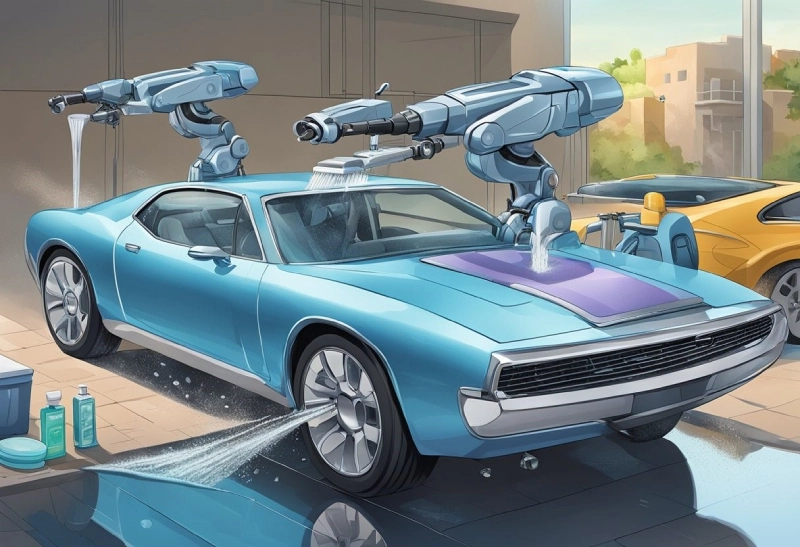
Tech-Driven Convenience at Your Fingertips:
- Subscription Wash Services: Imagine a monthly or yearly subscription for unlimited car washes. Mobile apps will allow scheduling washes, tracking progress, and even controlling in-wash features like tire shine or undercarriage cleaning.
- Artificial Intelligence for a Flawless Finish: AI-powered wash systems will use advanced sensors to scan car surfaces and customize wash cycles for optimal cleaning based on dirt levels and vehicle type.
- Robotic Wash Arms for a Gentle Touch: Touchless car washes will be even more sophisticated, employing robotic wash arms with soft, adaptable materials to ensure a thorough yet gentle clean, eliminating the risk of scratches.
Beyond a Clean Car: A Focus on Complete Car Care:
- Car Wash as a One-Stop Shop: Car washes might evolve into full-fledged car care centers. Express detailing services, on-site vacuuming stations with compressed air and upholstery cleaning tools, and even paint touch-up options could all be offered under one roof.
- Subscription-Based Detailing Packages: Imagine subscribing to a detailing package that includes regular washes and interior cleaning services, ensuring your car stays showroom-ready with minimal effort.
- Connected Car Wash Experiences: Telematics data from your car could be integrated with the wash system, automatically adjusting wash cycles based on recent driving conditions (like dusty off-road adventures) for a truly personalized clean.
The future of car washing promises to be a confluence of environmental consciousness, technological innovation, and ultimate customer convenience. So, buckle up for a future where getting your car washed is not just a chore, but a seamless, tech-driven experience that leaves your car sparkling clean and the environment happy.
As technology continues to advance, the future of car washing looks promising. The industry is expected to become more tech-driven, eco-friendly, and consumer-focused than ever before. This section will discuss some of the industry trends and technological advancements that are shaping the future of car washing.
Frequently Asked Questions
Looking to achieve that showroom shine for your car? Here are some frequently asked questions to guide you through the car wash process:
Both methods have their pros and cons. Hand-washing allows for a more customized clean and is gentler on your car's paint. However, it requires more time and effort. Automatic car washes are convenient and fast, but they might not be as thorough, especially for heavily soiled cars, and some touch washes can cause minor scratches.
The ideal wash frequency depends on how often you drive and the environment your car is exposed to. Aim to wash your car every two weeks, or more often if you drive in dusty or rainy conditions, or park under trees where sap can accumulate.
Use a car-wash specific soap that is pH-balanced and gentle on paintwork. Avoid using household detergents, as they can strip away wax and dull the finish. Look for soaps that create a good lather to help loosen dirt and grime.
The key is to minimize water spots. Use a high-quality microfiber cloth to gently pat the car dry. Microfiber cloths are super absorbent and won't leave streaks or scratches. For a touch-free drying experience, consider using a car wash with air dryers.
After washing and drying, apply a coat of car wax to protect the paint and add shine. Waxing creates a hydrophobic layer that repels water, making future washes easier and protecting your car's paint from UV rays and environmental damage.
For a new car with a delicate paint finish, a touchless car wash is the safest option. These washes use high-pressure water jets and cleaning solutions to remove dirt without any physical contact, minimizing the risk of scratches.
Here are some other factors to consider:
- Level of clean needed: If your car is lightly soiled, a touchless wash might suffice. For a more thorough clean, you could consider a hand wash using the two-bucket method (one for soapy water, one for rinsing) with high-quality microfiber cloths.
- Your comfort level: If you prefer a hands-off approach, a touchless car wash is ideal. If you enjoy the process of washing your car yourself, a hand wash might be more enjoyable.
Commercial car wash brushes are typically made from a combination of materials:
- Foamed Polyethylene (PE): These soft, closed-cell foam brushes are gentle on paint and effective at removing dirt.
- Fabric: Microfiber cloths are sometimes incorporated into the brush design for a more scratch-resistant clean.
- Nylon: Some brushes might use stiffer nylon bristles for tougher cleaning tasks on wheels or heavily soiled areas. However, these should be used with caution on newer cars to avoid scratching the paint.
The investment required to open a car wash can vary significantly depending on several factors:
- Car wash type: Automatic car washes require a higher initial investment due to the cost of equipment and tunnel construction. Self-serve car washes generally require less upfront investment.
- Location: Land and building costs will vary depending on your location.
- Equipment: The type and quality of equipment you choose will impact the overall cost.
A rough estimate for opening a car wash could range from $100,000 to $1 million or more. It's crucial to conduct thorough market research, create a detailed business plan, and secure financing before embarking on this venture.
See Also :
- Best Car Cleaning Service in Noida - Find the best car cleaning services in Noida and keep your car looking new.
- Car Detailing Franchise
- Car Detailing Products - Discover the best products for car detailing and how to use them to achieve a professional shine.
- Detailing Services for Different Cars - Learn about the different types of detailing services available for different types of cars and which one is best for you.
- Car Detailing for Different Seasons - Find out how to prepare your car for different seasons with the right detailing methods and products.
- How to clean your car’s interior - Learn the 8 best techniques and products for cleaning the interior of your car, including the seats, dashboard, and carpets.
- How to clean car exterior in 6 easy steps - Discover the best ways to wash and protect the exterior of your car, including the paint, wheels, and windows.
- Detailing vs Washing - Understand the difference between detailing and washing and how to choose the right service for your car's needs.
- Best Bike and Car Detailing Service in Delhi NCR, India

